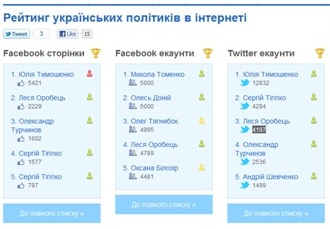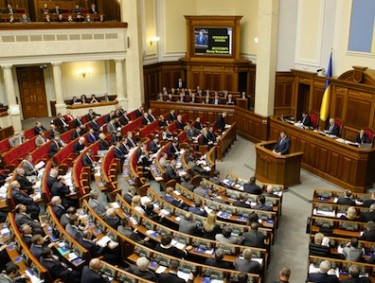With over a million of Ukrainians using [1] [uk] Facebook and over 80,000 users [2] on Twitter, more and more Ukrainian politicians choose to join these services. Currently, there are over 50 of them on Facebook and over 20 political parties and their individual members on Twitter.
Ukrainian Internet business and social media marketing website Watcher.com.ua has set up a real-time popularity ranking [3] [uk] of politicians’ accounts on these two services.
Ukrainian politicians’ popularity on Facebook and Twitter
According to Watcher.com.ua, as of April 12, 2011, most popular Facebook pages were: opposition leader “Batkivshchyna” (uk. Fatherland) party head Yulia Tymoshenko’s (fake), with 5,421 “likes”; MP Lesya Orobets’, with 2,229 “likes”; and deputy head of “Batkivshchyna” Oleksandr Turchynov's, with 1,602 “likes”.
 [3]
[3]A screenshot of Ukrainian politicians' popularity rankings on Facebook and Twitter, as of April 12, 2011
Facebook accounts with 5,000 friends belonged to MPs Mykola Tomenko and Oles Doniy, leader of the right-wing party VO “Svoboda” (uk. Freedom) Oleh Tyahnybok had 4,995 friends, MP Lesya Orobets – 4,789 friends.
Most popular (verified) Twitter accounts belonged to: Yulia Tymoshenko – 12,832 followers, “Sylna Ukraina” (uk. Strong Ukraine) party leader and Vice Prime Minister Serhiy Tihipko – 4,294 followers, and Lesya Orobets – 4,197 followers.
Politicians’ activity on online social networks
On April 4, 2011, Maksym Savanevsky of Watcher.com.ua also published an analysis [4] [uk] of the politicians’ online activity on Facebook and Twitter. Below is a translation of the major findings:
The main conclusion that has been drawn during our analysis of Ukrainian politicians’ activity on social networks is that not a single political force has some sort of a strategy of operating in this environment. Problems become apparent already at the technical level. For instance, “Za Ukrainu” [For Ukraine] party is present on Facebook in a form of a private account, which can be deleted at any time due to breaching the rules of the social network.
Political party “Sylna Ukraina” [Strong Ukraine] representatives have chosen a rather strange strategy. They have created two pages, for both the party and Sergiy Tihipko [party leader] in Ukrainian and Russian languages – 4 pages in total. I can’t imagine how anyone at their headquarters could agree to divide the audience based on the language principle, but some of them must have been convinced successfully. The content is identical in both language versions.
Some politicians on Facebook behave like regular users and do not differ from others in any significant way – they discuss photos of their friends, share impressions of something they have just purchased, rarely mentioning their political activity. I think a part of Volodymyr Aryev and Oles Doniy’s friends have no idea that these two are MPs.
But there are some differences in their behavior. For instance, Doniy already has 5,000 friends, which is the limit on Facebook. It is difficult to imagine a person who could have not even 5,000, but 500 real-life friends. So, it’s apparent that many people would like to befriend an MP, and the latter does not refuse their requests.
Another MP Andriy Shevchenko has chosen a different way. Although he has been the first Ukrainian politician to join Facebook, he has a comparatively small number of friends – just a few hundred. Most likely those few hundred are his actual friends. But on Twitter, where users need no confirmation from someone they want to follow, Shevchenko has about 1,500 followers, and with this number is the 5th among the Ukrainian politicians [on Twitter].
On reaching the limit of 5,000 friends, one of the politicians-pioneers [of social media] – Lesya Orobets, has changed her strategy. Parallel with a Facebook account, she has created a Facebook page. All her activity is now focused on the page, while she uses the private account to communicate with her real friends. Orobets is quite successful on Twitter as well – she has over 4,000 followers and has a chance of taking the 2nd place and leaving Serhiy Tihipko behind.
We’re expecting the number of politicians’ Twitter accounts to increase in the nearest time. It is connected with the simplicity of the service as well as with its successful utilization by Yulia Tymoshenko [the first Ukrainian politician to have a “verified account” on Twitter]. Just in one and a half month she has accumulated 12,000 followers, which is unexpectedly good, considering the overall Ukrainian Twitter audience being 100,000-150,000 users.
Another observation – in contrast with 2009-2010, the activity of fake Facebook accounts of politicians has declined. Nevertheless, Yulia Tymoshenko’s page still holds the top place on Facebook ratings, although it has nothing to do with either her political party “Batkivshchyna” or with its leader.
Considering the potential transformation of the Ukrainian electoral system from proportional to a majority-based, many politicians might want to start thinking about the Internet today, as an important instrument of working with their electorate, and especially in constituencies that are comprised of cities with 100,000 residents and up.
 [5]
[5]Session in the Ukraine parliament, Kiev. Image by Sergei Svetlitsky, copyright Demotix (07/04/2011).
Social media, Ukrainian government and the opposition
Although online activity of Ukrainian politicians continues to increase, the number of those personally present on social networks remains comparatively low. This can be explained by the fact that the majority of political actors still perceive television as the main channel of communication with the electorate, and control over television – as the key [6] [uk] to political success. However, taking into account the deteriorating press freedom [7] [en] in Ukraine, it is understandable why most politicians who actively utilize social media (see rankings above) represent the opposition.
As for the President of Ukraine, according to official sources, he has no accounts on social media networks [8] [uk], including Twitter. A fake Twitter account @PresidentUA that seems to mirror some official announcements from the official presidential website currently has almost 2,000 followers, and another one, @Prezident_UA, has 715. A fake Twitter account that impersonates the Ukrainian PM Mykola Azarov (@PremierUkraine) has over 1,300 followers.
Back in 2009, the previous Ukrainian President Victor Yushchenko set up a Twitter account @President_UA (see this GV post [9]), which apparently was maintained by his press-service. However, many Internet users criticized it for being boring and generally demonstrating a very low expertise with using the micro-blogging tool.